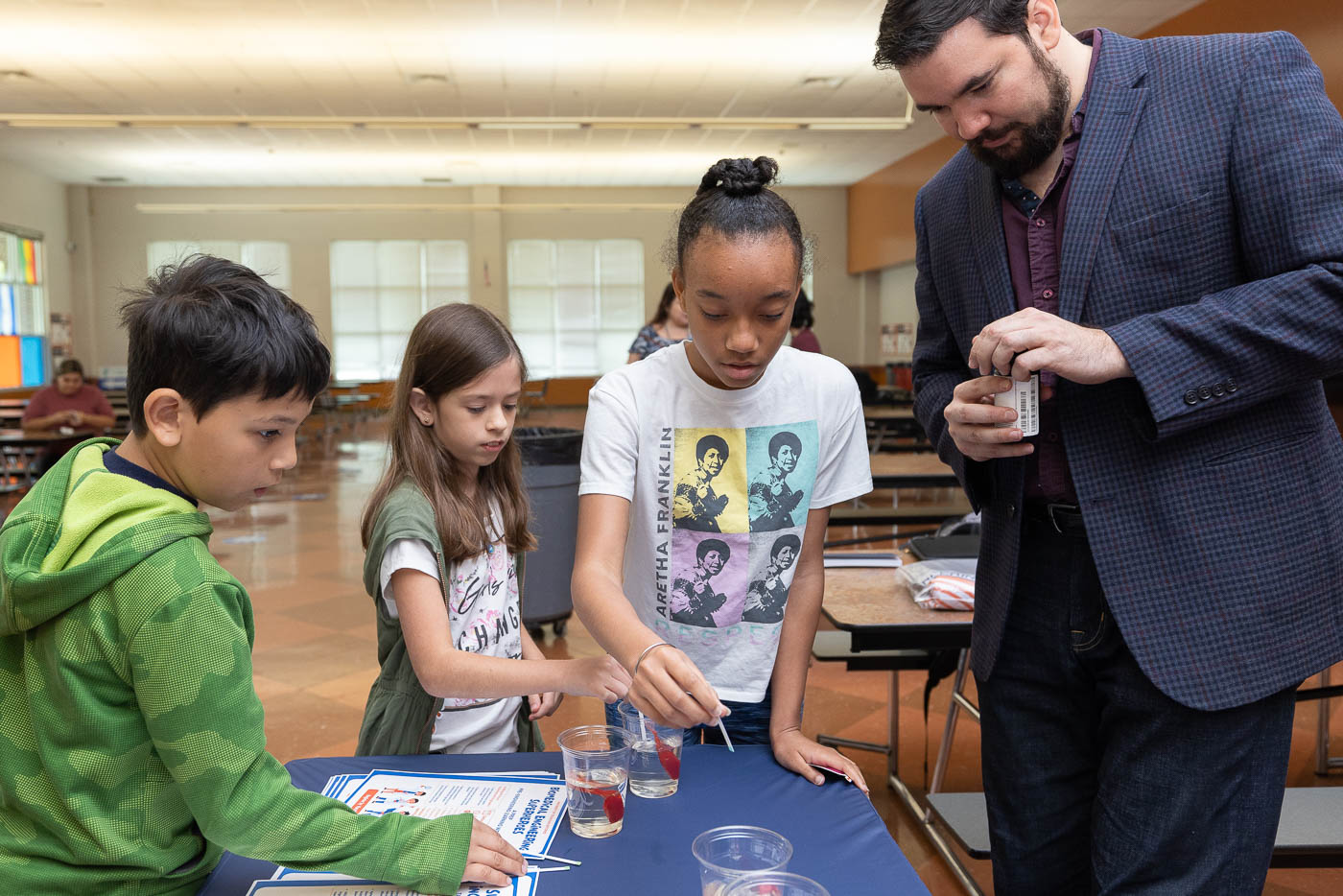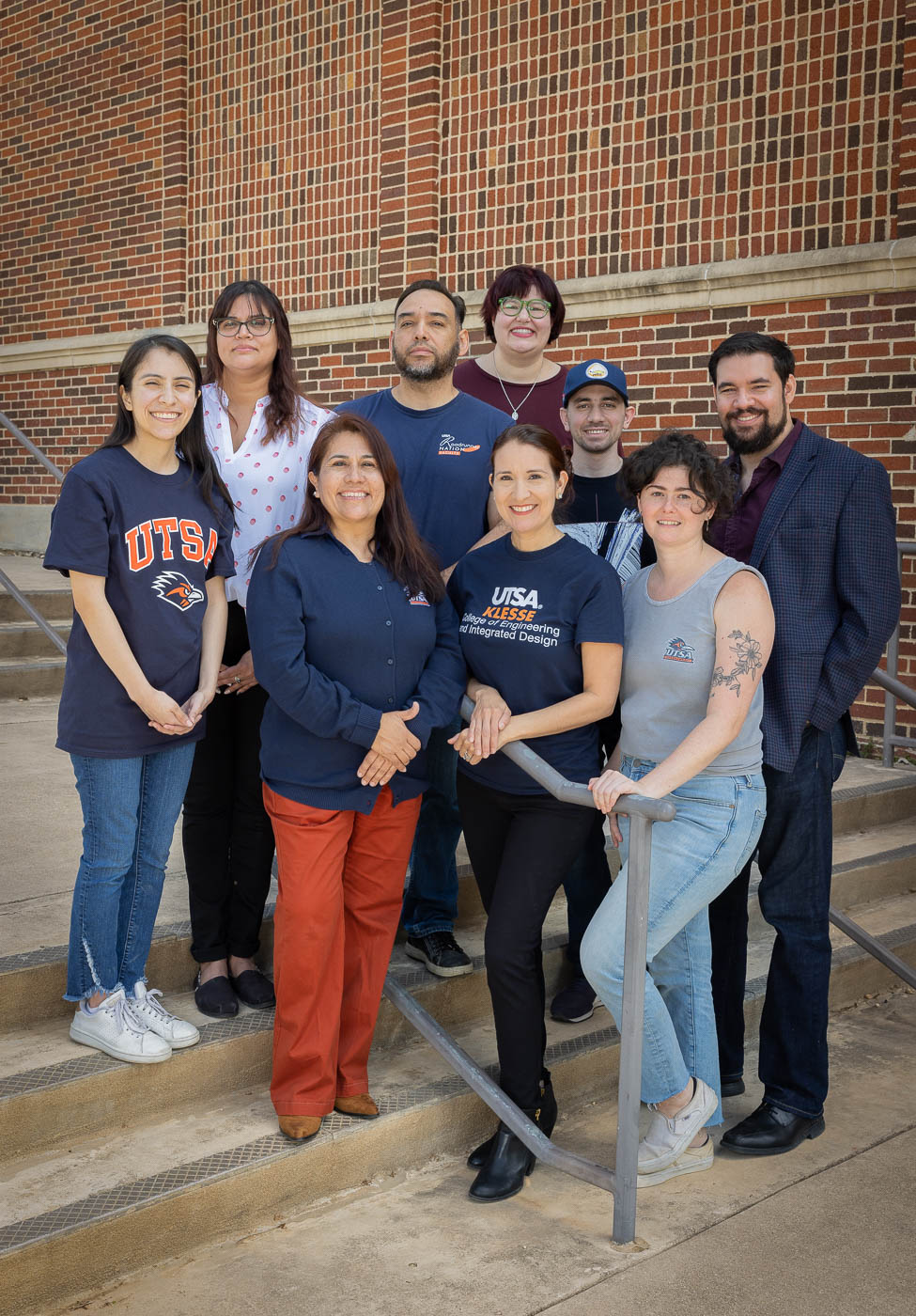Posted on August 12, 2024 by Sean M. Wood

Biomedical Engineering Superheroes class in session
It is never too early for students to start their STEM education. Science, technology, engineering and math foster critical thinking, problem solving, collaboration, creativity and technology literacy. Those skills are vital for educational and career success.
Now a group of UTSA professors have developed a program aimed at developing these skills and fostering interest in biomedical engineering and clinical research among young learners from underserved communities. The Biomedical Engineering Superheroes program provides motivating learning experiences to kids and STEM training for their teachers.
“We want to know what kinds of informal science education activities can support students to gain awareness of and prepare for career and workforce readiness in fields related to improving public health,” said Dr. Araceli Martinez Ortiz, the Microsoft President’s Endowed Professor of Engineering Education at UTSA. “What community health priorities can be addressed to ensure cultural relevance and familiarity of topics for students and their parents? And in what ways can teachers be involved in gaining professional learning related to the new Texas science standards focused on scientific and engineering practices?”
Ortiz and colleagues from the Margie and Bill Klesse College of Engineering and Integrated Design, with professors from the College of Education and Human Development, submitted a proposal for the program to the National Institutes of Health and received a $1.35 million grant for five years. The grant will fund the extracurricular program to address the science and engineering education needs of students but in the context of offering improved care to patients with significant types of health challenges including obesity, diabetes, heart disease and kidney disease.
Project Overview
Funding for the Biomedical Engineering Superheroes program is through the NIH Science Education Partnership Award (SEPA). The program supports informal science education activities for students that: (1) enhances the diversity of the biomedical, behavioral, and clinical research workforce and (2) fosters a better understanding of NIH-funded biomedical, behavioral, and clinical research and its public health implications.
Superheroes will integrate health science content, engineering design skills, data science, and reading into its curriculum. The program will feature curricular units demonstrating the scientific and engineering design efforts that may support improved care to patients with four prevalent conditions: obesity, diabetes, heart disease, and kidney disease.
The integration of engineering into elementary science standards must align with the new Texas standards. Dr. Cynthia Lima, Assistant Professor of STEM Education, explains what this means for curriculum, “This alignment provides an opportunity to design a rigorous and engaging curriculum that allows students to participate in scientific practices, such as making observations, collecting and analyzing data, sharing knowledge, and engineering design.”
Designed for academic content to be delivered over five Saturdays, the program will culminate in a public health fair. This structure aims to provide students with comprehensive and engaging educational experiences while including the rest of the family in the fair. Students will be encouraged to pursue summer learning opportunities with the Manuel P. Berriozábal Prefreshman Engineering Program (PREP) as they move on to middle school.
“The solution of complex problems or issues requires that we work together as a community; we can’t operate in silos,” said Dr. Belinda Bustos Flores, professor of Bicultural and Bilingual Studies and founder and Director of The Academy for Teacher Excellence, on the partnership between COEHD and Klesse College. “It is vital that teachers be prepared to engage in authentic activities that will stimulate children’s imagination and thinking.”
Dr. Marissa Wechsler, an Assistant Professor in the Department of Biomedical Engineering and Chemical Engineering at UTSA and San Antonio native, is a Co-Investigator on this NIH SEPA grant. “I am excited to be a part of this team to bring my research and knowledge in biomedical engineering to elementary school students and their families,” said Wechsler. “My parents were educated in the Edgewood School District, so to be in a position to develop STEM content to invest in the community is deeply rewarding.”

The Partners
Edgewood, San Antonio, and Southwest are the three independent school districts whose superintendents have signed letters of support for the program. In each letter, the school leaders mentioned the significant percentage of Hispanic students, the substantial percentage of students from economically disadvantaged homes, and the need for improved STEM content delivery.
Joining Ortiz and Wechsler as co-principal investigators are Dr. Lyle Hood, associate professor of Mechanical Engineering and lead of the Medical Design Innovations Laboratory; Dr. Belinda Flores, professor of Bicultural and Bilingual Studies and founder and Director of The Academy for Teacher Excellence; Dr. Cynthia Lima, Assistant Professor of STEM Education; Dr. Mario Torres, Dean and Professor of Educational Administration; and Alberto Vasquez, Associate Professor of Practice, TRIO Student Support.
“This funding will enable us to deliver culturally relevant STEM engagement activities through an out-of-school program fostering collaboration between faculty from UTSA’s College of Engineering and College of Education, with the support of three San Antonio school districts,” Ortiz says. “We aim to motivate and prepare a future biomedical engineering workforce while raising awareness about these critical health issues in our community.”

